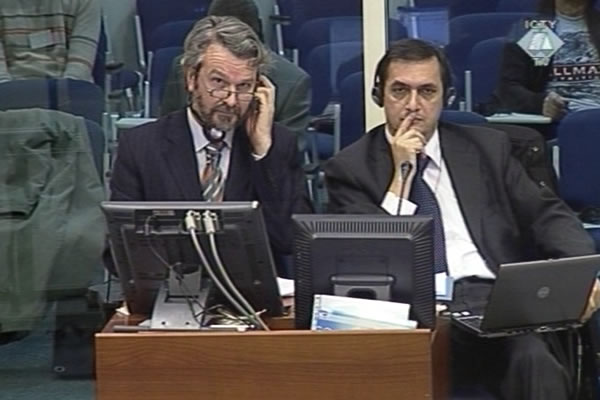Home
GOTOVINA AND MARKAC VERSUS THE REPUBLIC OF CROATIA
After a four-hour hearing attended by the representatives of the Croatian government, the Trial Chamber with Judge Orie presiding issued an urgent order to the Croatian authorities to cease further inspection of documents and items confiscated from current or former members of Ante Gotovina’s defense team. The documents and items were confiscated in an action that targeted persons suspected of hiding and/or destroying documents stolen from the state archives
 Joško Paro i Josip Čule, predstavnici Republike Hrvatske u sudnici Tribunala
Joško Paro i Josip Čule, predstavnici Republike Hrvatske u sudnici Tribunala The Trial Chamber granted this evening a motion filed by the defense of Ante Gotovina and Mladen Markac and issued an urgent order to the authorities of the Republic of Croatia to cease any further inspection of the contents of the documents and items including computers confiscated from the current or former members of Gotovina’s defense team. The authorities were ordered to seal those items and keep them in their possession. The order comes into effect immediately and remains in effect until further notice.
This concluded the 4-hour hearing on the conflict that erupted yesterday, one that might be dubbed as Gotovina and Markac vs. the Republic of Croatia. Protesting against the action of the Croatian police, the two generals didn’t attend the hearing. On Wednesday, 9 December 2009, the Croatian police searched the apartments, offices and cars of a large number of persons suspected of hiding and/or destroying archive documentation. Some of them were detained and preliminary interviews were conducted with them. As alleged by Gotovina’s counsel Luka Misetic, two current and one former member of general’s defense team were among those detained and questioned.
At the beginning of the hearing, Ambassador Josko Paro and deputy state prosecutor Josip Cule explained in detail why and how the action in which suspects were searched and detained was conducted. Paro and Cule appeared as the representatives of the Republic of Croatia. Both Paro and Cule said that the action was conducted not only to respond to the request of the Trial Chamber and the OTP to deliver documents. Hiding and/or destroying documents that should be kept in state archives is a crime, prosecuted ex officio, Paro and Cule noted. To prove that the action was not launched because of the pressure exerted by chief prosecutor Brammertz, as the defense purported, Ambassador Paro offered to show the full correspondence between the Croatian authorities and the OTP to the Trial Chamber. The Trial Chamber accepted this proposal, noting that both sides in the proceeding would have access to the correspondence.
The main motive behind the decision to order the Croatian authorities to temporarily seal the confiscated materials is the concern of the Trial Chamber that there may be documents protected by the lawyer-client privilege among them. The Trial Chamber believes a procedure should be established to determine if any of the confiscated documents should be protected by the privilege.
In order to show that the privilege didn’t cover the evidence of crimes, Judge Orie used the example of a situation where a person gave a knife he had used to murder someone to his counsel, asking the counsel to ‘safeguard’ it in his office. Gotovina’s defense counsel Misetic agreed that the knife would not be protected by the lawyer-client privilege: keeping it would be obstruction of justice. It is logical to assume the same for the so-called ‘artillery logbooks’ from Operation Storm if they were to be found in a lawyers’ office.
Linked Reports
- Case : Gotovina et al. - "Operation Storm"
- 2009-12-10 GOTOVINA AND MARKAC REFUSED TO ENTER COURT
- 2009-12-09 VITEZ DEFENDS MARKAC
- 2009-12-08 SKABRNJA AS ‘EXAMPLE’ FOR CROATIAN VILLAGES IN KRAJINA
- 2009-12-16 ‘ACCOUNTANCY HEARING’ ABOUT ARTILLERY DOCUMENTS
- 2009-12-17 EUROPEAN UNION ASKED TO DELIVER ‘KNIN LOGBOOK’
- 2009-12-18 WITNESS: ‘ARMY TROOPS, NOT POLICE, BURNED HOUSES’
